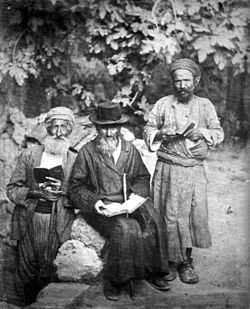Judah Touro
This article's lead section may be too short to adequately summarize the key points. (February 2021) |
Judah Touro | |
|---|---|
New Orleans, Louisiana | |
| Occupation(s) | Businessman, philanthropist |
| Parent(s) | Isaac Touro Reyna Touro |
Judah Touro (June 16, 1775 – January 18, 1854) was an American businessman and philanthropist.[1]
Early life and career
Touro's father
Touro fell in love with his cousin but was forbidden marriage by her father, who sent him on a trading voyage to the Mediterranean in hopes of ending the romance.[5] Judah went to New Orleans in October 1801 where he opened a small store. He sold soap, candles, codfish, and other exports of New England, eventually becoming a prominent merchant and ship owner, particularly after the Louisiana Purchase propelled the growth of the region and its commerce.
He enlisted in Andrew Jackson's army in the War of 1812 in spite of poor health. He was physically incapacitated from fighting, so he volunteered to carry ammunition to the batteries in the Battle of New Orleans, in which he was struck on the thigh by a 12-pound shot which tore off a large mass of the flesh. He was given up for dead but was saved by Rezin Davis Shepherd, a Virginia merchant. Shepherd helped nurse him back to health, and their close friendship continued throughout their lives. He recovered for a year after the war, then resumed building his business interests in shipping, trade, and real estate.[5] He made a point of never mortgaging current properties to acquire new ones, and he lived a simple life in a small apartment. "I have saved a fortune by strict economy," he said, "while others had spent one by their liberal expenditures."[6]
Charitable works
Judah Touro's lasting fame, however, was as a philanthropist. He contributed $40,000—an immense sum at the time—to the Jewish cemetery at Newport, and bought the Old Stone Mill there, at that time thought to have been built by Norsemen, giving it to the city.[7] The park surrounding it is still known as Touro Park.
In New Orleans, he used his business profits to buy and endow a cemetery, and to build a synagogue, an almshouse and an infirmary for sailors suffering from
Touro also participated in charity on a personal level, giving $1,500 to a woman who asked for help for her starving children and paying the $900 debt of an alcoholic man with a large family so that the man's children would be spared the separation from their parent. Rev. Theodore Clapp reported that Touro had given him not less than $20,000 over the course of their friendship.[12] These stories are said to represent only a small portion of his personal giving, as he preferred to remain anonymous.[13] Morais remarks, "It would be an impossibility to enumerate all the acts of munificent beneficence performed by Judah Touro."[14]

At his death, his estate provided endowments for nearly all the Jewish congregations in the United States, bequests to hospitals and orphanages in Massachusetts. His bequeaths funded the first Jewish residential settlement and almshouse outside the
He is buried in the Jewish Touro Cemetery of Newport. The inscription on his tombstone reads: "To the Memory of / Judah Touro / He inscribed it in the Book of / Philanthropy / To be remembered forever."[16]
New Orleans

Touro lived in New Orleans for more than 50 years, and at the time of his death, was one of the wealthiest and most prominent members of the city's Jewish community. Touro Infirmary and Touro Synagogue named in his memory and thanks to his charity are among his more prominent legacies in the city.[18]
A Judah Touro Scholarship is given at
Notes
- ^ "Touro, Judah: The Database of Early American Jewish Portraits". The American Jewish Historical Society. 2009. Retrieved 9 July 2012.[permanent dead link]
- ^ Henry Samuel Morais. Eminent Israelites of the Nineteenth Century: A Series of Biographical Sketches, p. 336.
- ^ "Judah Touro".
- ^ Thomas Fleming. "'He Loved to Do Good in Secret'," Guideposts, October 1998, p. 28.
- ^ a b Fleming, p. 29.
- ^ Jewish Virtual Library
- ^ The Philanthropy Hall of Fame, Judah Touro Archived 2014-11-06 at the Wayback Machine
- ^ ""...a charitable Institution for the relief of the Indigent sick..."". Archived from the original on 2018-11-15. Retrieved 2016-11-08.
- ^ a b Fleming, p. 30.
- ^ Morais, p. 337.
- ISBN 0-8147-0500-6
- ^ Clapp, Theodore. Autobiographical Sketches and Recollections, during a thirty-five years' residence in New Orleans, Boston: Phillips, Sampson & Co., 1857. P.103
- ^ Fleming, pp. 29-30.
- ^ Morais, p. 338.
- ^ Fifty years' work of the Hebrew Education Society of Philadelphia, 1848-1898. Philadelphia, Pennsylvania: Hebrew Education Society. 1899.
- ^ a b Fleming, p. 31.
- ^ Margalit Fox (2010). "Rabbi Bernard Lander, the Founder of Touro College, Is Dead at 94". The New York Times. Retrieved February 19, 2013.
- ^ "1854:New Orleans had a good friend in businessman Judah Touro". The Times Picayune. 2011. Retrieved 9 July 2012.
- Baton Rouge Morning Advocate. Retrieved 28 August 2009.
Further reading
- Adelman, David C. Life and times of Judah Touro. [Newport] Touro Fraternal Association, 1936.
- Gutstein, Morris A. Aaron Lopez and Judah Touro: A refugee and a son of a refugee. New York, Behrman's Jewish Book House, 1939. (An earlier version of this book was published in 1931 under the title Aaron Lopez and Judah Touro.)
- Gutstein, Morris. The Touro family in Newport. Newport Historical Society, no. 94, 1935, pp. 1–39.
- Huhner, Leon. The life of Judah Touro (1775–1854). Philadelphia, Jewish Publication Society of America, 1946.

